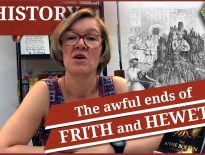On this day in Tudor history, 5th July 1589, three Essex women were hanged at Chelmsford, Essex, after being found guilty of murder by witchcraft. Their names were Joan Cunny, Joan Prentice and Joan Upney.
In today's talk, I explain how these women came to be accused of witchcraft and why they were hanged.
You can listen to historian Kate Cole’s wonderful talk on the Witches of Elizabethan and Stuart Essex here
Also on this day in history:
- 1535 - Sir Thomas More, who was imprisoned in the Tower of London and awaiting execution, wrote his final letter. It was to his beloved daughter, Margaret Roper, and it was written in coal.
- 1583 – Execution of John Copping, shoemaker and religious radical, for 'dispersing' books by Robert Browne and Richard Harrison, which were viewed as “sundry seditious, schismatical and erroneous printed books”. Copping had been arrested with his friend Elias Thacker, a tailor, and Thacker was executed the day before. Books were burned at each of their executions.
- 1589 – Executions of Catholic priests and martyrs George Nichols and Richard Yaxley, along with Catholics Thomas Belson and Humphrey Prichard. Nichols and Yaxley were hanged, drawn and quartered, and Belson and Prichard were hanged.
- 1591 – Burial of Humfrey (Humfray) Cole, goldsmith, engraver, mathematical instrument maker and die sinker, at St Gregory by St Paul's, London. Cole was a die sinker at the Tower of London mint. His mathematical instruments included an armillary sphere, astrolabe and instruments needed for Martin Frobisher's 1576 voyage. Twenty-six of his instruments still survive today.
- 1600 – Execution of Jean Livingston (Lady Warriston) at the Girth Cross in Edinburgh. She was beheaded by the 'Maiden', a type of guillotine, for murder. Livingston was unhappily married to John Kincaid of Warriston when her nurse, Janet Murdo, came up with the idea of murdering him to release Livingston from her torment. Livingston asked a servant, Robert Weir, to do the deed, which he did on the night of 1st July 1600. Murdo was burned at the stake on Castle Hill and Weir, who had fled after the murder, was arrested in 1604 and 'broken on the wheel' at Edinburgh.



Did these women confess after being walked, deprived of sleep for days, pricked and beaten as they would have been after they were accused of witchcraft? The Essex trials are as famous as the Pendle and Berwick witches, but in England as you said it was murder so they were hung and not burnt as in Scotland.